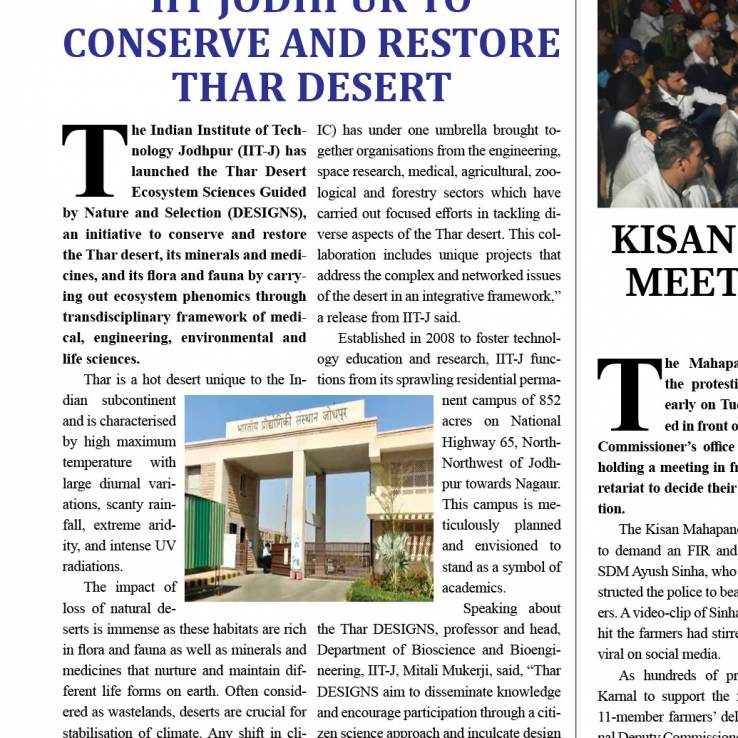The impact of loss of natural deserts is immense as these habitats are rich in flora and fauna as well as minerals and medicines that nurture and maintain different life forms on earth. Often considered as wastelands, deserts are crucial for stabilisation of climate…reports Asian Lite News.
The Indian Institute of Technology Jodhpur (IIT-J) has launched the Thar Desert Ecosystem Sciences Guided by Nature and Selection (DESIGNS), an initiative to conserve and restore the Thar desert, its minerals and medicines, and its flora and fauna by carrying out ecosystem phenomics through transdisciplinary framework of medical, engineering, environmental and life sciences.
Thar is a hot desert unique to the Indian subcontinent and is characterised by high maximum temperature with large diurnal variations, scanty rainfall, extreme aridity, and intense UV radiations.
The impact of loss of natural deserts is immense as these habitats are rich in flora and fauna as well as minerals and medicines that nurture and maintain different life forms on earth. Often considered as wastelands, deserts are crucial for stabilisation of climate.

Any shift in climate change or anthropogenic activity can lead to mal adaptations for organisms who live at the ebb of physiological extremes, loss of diversity through extirpations and ultimately an ecosystem collapse. This threatens the lives and livelihoods of the native inhabitants.
“To address this, the Jodhpur City Knowledge and Innovation Cluster (JCKIC) has under one umbrella brought together organisations from the engineering, space research, medical, agricultural, zoological and forestry sectors which have carried out focused efforts in tackling diverse aspects of the Thar desert. This collaboration includes unique projects that address the complex and networked issues of the desert in an integrative framework,” a release from IIT-J said.
Established in 2008 to foster technology education and research, IIT-J functions from its sprawling residential permanent campus of 852 acres on National Highway 65, North-Northwest of Jodhpur towards Nagaur. This campus is meticulously planned and envisioned to stand as a symbol of academics.
Speaking about the Thar DESIGNS, professor and head, Department of Bioscience and Bioengineering, IIT-J, Mitali Mukerji, said, “Thar DESIGNS aim to disseminate knowledge and encourage participation through a citizen science approach and inculcate design thinking across the entire collaborative network.”

Under this initiative, the researchers will use IOT enabled devices and Big Data analytics framework to crowd source observations from the local ecosystem to the regional level, keeping the cultural context and traditional medicine knowledge in perspective.
“Researchers would also integrate computer vision and machine learning along with domain knowledge to infer links between environment, phenotype and genotype at geo-spatio temporal scales and identify signatures of Thar DESIGNS for early actionable intervention strategies. This knowledge generation will result in providing a ‘Desert Ecosystem Knowledge Grid’ that could foster the cycle of engineering-research-development-commercialisation,” the release said.

Leave a Reply